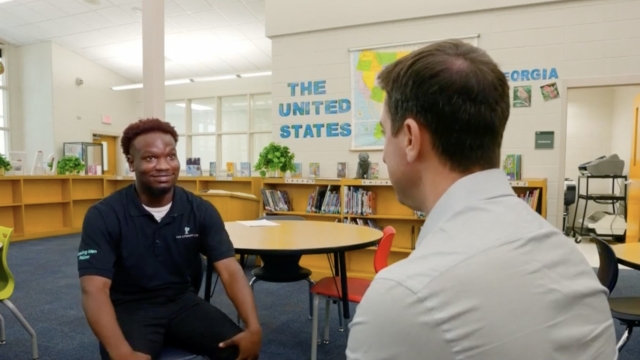Just 23% of teachers nationwide are men. Just 6% are Black. And fewer than 2% of America's teachers are Black men.
Dayshon Smith grew up in a largely Black town in Mississippi. But he didn't have a Black male teacher until junior high. Now he's working as a tutor at Cleveland Avenue Elementary School in Atlanta.
"I instantly thought, 'When did I have a Black male teacher?' And I didn't have one until literally I was all the way in the eighth grade, and he was the only one I had," Smith said.
Studies nationwide have measured the impact of having a teacher of the same race early on. Results have varied, except in one key way: The impact, almost always, is stronger on students of color.
Smith is part of Leading Men Fellows, run by The Literacy Lab. He's one of 18 participants in Atlanta, out of roughly 100 across the country. They spent three weeks in training before starting 10 months in the same classroom. They work five hours a day for $17 per hour. They are eligible for thousands of dollars in college scholarships.
SEE MORE: More Black Families Are Opting For Homeschooling
Julius Cave, who runs the program in Atlanta said, "You know, I think about stereotypes that I hear about young men, young people in general, young Black men, right? And if we were to say, 'We got 20 Black men in the room, what's going on?', right, how many people are going to say they're being trained to be educators?"
Smith says the program has had an impact on him that literally changed his outlook on life, "Joining this literacy program, the Leading Man Fellows, it saved my life. I was on the edge of, you know, I wanted to commit suicide before I moved here because I felt like when I was waking up, I didn't have a purpose or anything, or I felt like I wasn't worth anything to no one."
Smith adds, "I used to cry most every night trying to figure out like, 'Why am I here?' I feel like I didn't have a reason to be here. So I just I wanted to do it. I wanted to just escape life."
Smith says he spent his whole childhood seeing few lanes in which to grow. Weeks after he moved to Atlanta, he connected with the program that saved his life and is shining light on many more.
"Waking up, knowing them, going to see someone smile and feel that love and their embrace, they gave me a reason to wake up," Smith said.
Trending stories at Scrippsnews.com




